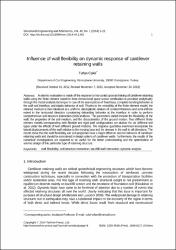Influence of wall flexibility on dynamic response of cantilever retaining walls

View/
Access
info:eu-repo/semantics/closedAccessDate
2014Access
info:eu-repo/semantics/closedAccessMetadata
Show full item recordAbstract
A seismic evaluation is made of the response to horizontal ground shaking of cantilever retaining walls using the finite element model in three dimensional space whose verification is provided analytically through the modal analysis technique in case of the assumptions of fixed base, complete bonding behavior at the wall-soil interface, and elastic behavior of soil. Thanks to the versatility of the finite element model, the retained medium is then idealized as a uniform, elastoplastic stratum of constant thickness and semi-infinite extent in the horizontal direction considering debonding behavior at the interface in order to perform comprehensive soil-structure interaction (SSI) analyses. The parameters varied include the flexibility of the wall, the properties of the soil medium, and the characteristics of the ground motion. Two different finite element models corresponding with flexible and rigid wall configurations are studied for six different soil types under the effects of two different ground motions. The response quantities examined incorporate the lateral displacements of the wall relative to the moving base and the stresses in the wall in all directions. The results show that the wall flexibility and soil properties have a major effect on seismic behavior of cantilever retaining walls and should be considered in design criteria of cantilever walls. Furthermore, the results of the numerical investigations are expected to be useful for the better understanding and the optimization of seismic design of this particular type of retaining structure.

















